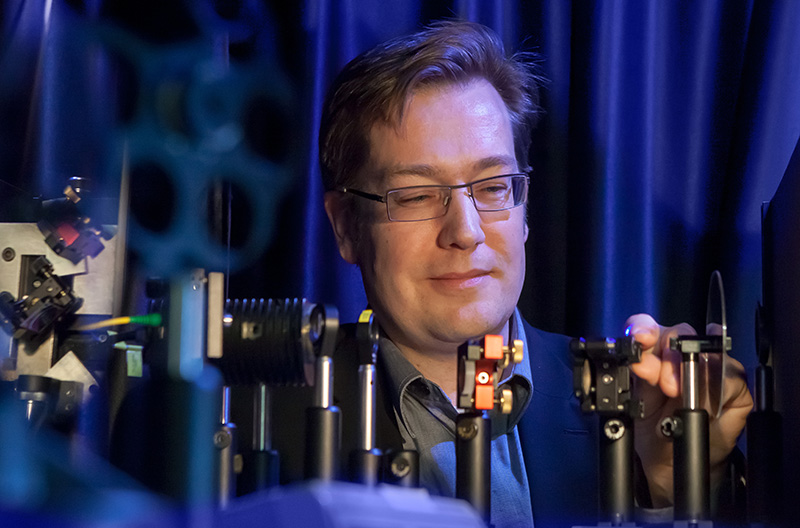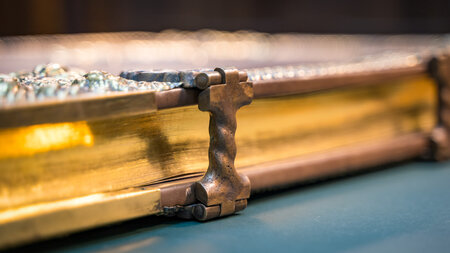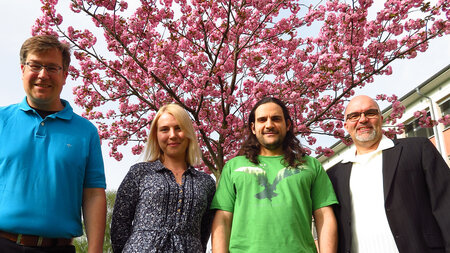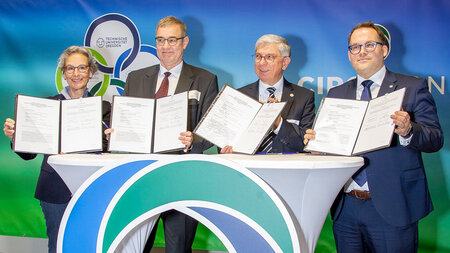Interaction of light with solids in experiment and simulation
Eleven questions addressed to Prof. Dr. Carsten Deibel, who is the holder of the Professorship of Optics and Photonics of Condensed Matter, in particular for Sensor Systems and Analytics
-

"We study fundamental processes of light-matter interaction by the specific combination of mostly self-made experiments and mostly self-developed simulations," says Prof. Dr. Carsten Deibel about his research at TU Chemnitz. Photo: Uwe Meinhold
Prof. Dr. Carsten Deibel (39) holds the Professorship of Optics and Photonics of Condensed Matter, in particular for Sensor Systems and Analytics at the Faculty of Natural Sciences since March 2014. In eleven answers, he gives the readers of “University News“ an insight into his career, goals and time in Chemnitz.
What is actually ‘optics and photonics of condensed matter’?
The optics and photonics of condensed matter is a branch of Solid State Physics. We study the fundamental interaction of light with solids, especially semiconductors with suitable experiments, but also partly simulations. These studies are relevant for the development of applications. Thus, our research interests mainly include innovative solar cells that convert light into electrical energy as well as light-emitting diodes, which are beginning to glow by current flow in the reverse process.
TU Chemnitz is for me as a professor the right choice, because…
…here are excellent opportunities for research and cooperation.
Could you say a few words about your academic career?
I have studied Physics at the Universities of Bochum and Sussex (in Brighton, UK), and did my doctorate on the investigation of inorganic solar cells in Oldenburg. During a two-year post-doctoral research at the Interuniversity Microelectronics Centre (IMEC) in Belgium, I set off with organic semiconductors. Before I finally came to Chemnitz in March of 2014, I was working as a group leader at the University of Würzburg for almost nine years on ‘Organic solar cells’. There I was qualified as a university lecturer in 2011.
Describe your study time in about 15 words.
Great fun was the third year of studies in Physics with my first own experiments and simulations.
Did you have role models during your studies, who encouraged you to pursue a scien-tific career?
There were historical figures that fascinated me, for instance Einstein, Feynman and Gauß, but I did not actually need any encouragement.
What advice would you give to young students and graduates?
If someone wants to find out or create something new, one needs to be curious, and know the ”State of the art“ very well and remain critical – even to oneself.
What would you like to achieve in teaching for the future?
It is important for me that the students get the solid knowledge base and are encouraged to ask critical questions and work independently.
Which impact do you make in the research at TU Chemnitz?
We study fundamental processes of light-matter interaction in the time domain and in equilibrium by the specific combination of mostly self-made experiments and mostly self-developed simulations. As regards the application, for instance, we have a very good cooperation with colleagues from the Print and Media Technology on printed solar cells. In Chemnitz I see very relevant opportunities for cooperation.
There are around 45,000 professors at German universities. What sets you apart from others?
Many professors can investigate many interesting problems. Our priorities are highly complementary with those of local colleagues and from other universities and institutes.
Which place do you show your guests the most in Chemnitz?
I find particularly interesting the Wilhelminian Style villas at Kaßberg and Schloßberg as well as the Rabenstein forest. For families with children I recommend the Küchwald park with its train. Depending on the season: Downtown with its Christmas market.
How do you play a part in the life of the city?
I shave not yet played a part, as getting my group started in Chemnitz is my current priority.
Further information about professorship at: https://www.tu-chemnitz.de/physik/OPKM/groupmembers_opkm.php
(Translation: Nataliia Boiko)
Katharina Thehos
26.01.2015





